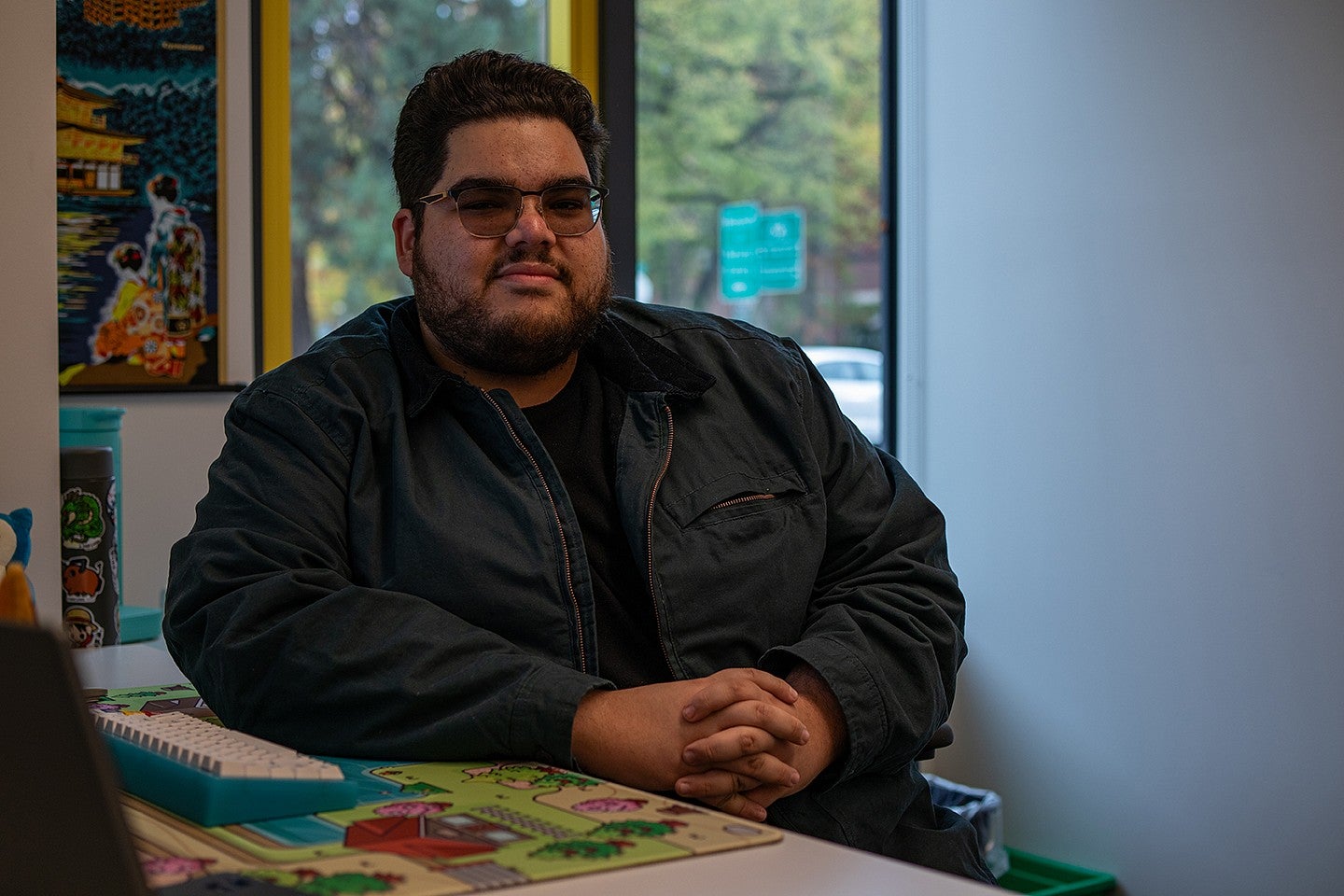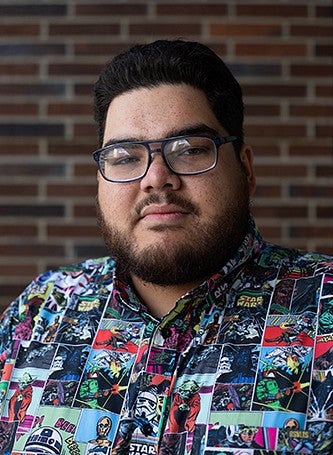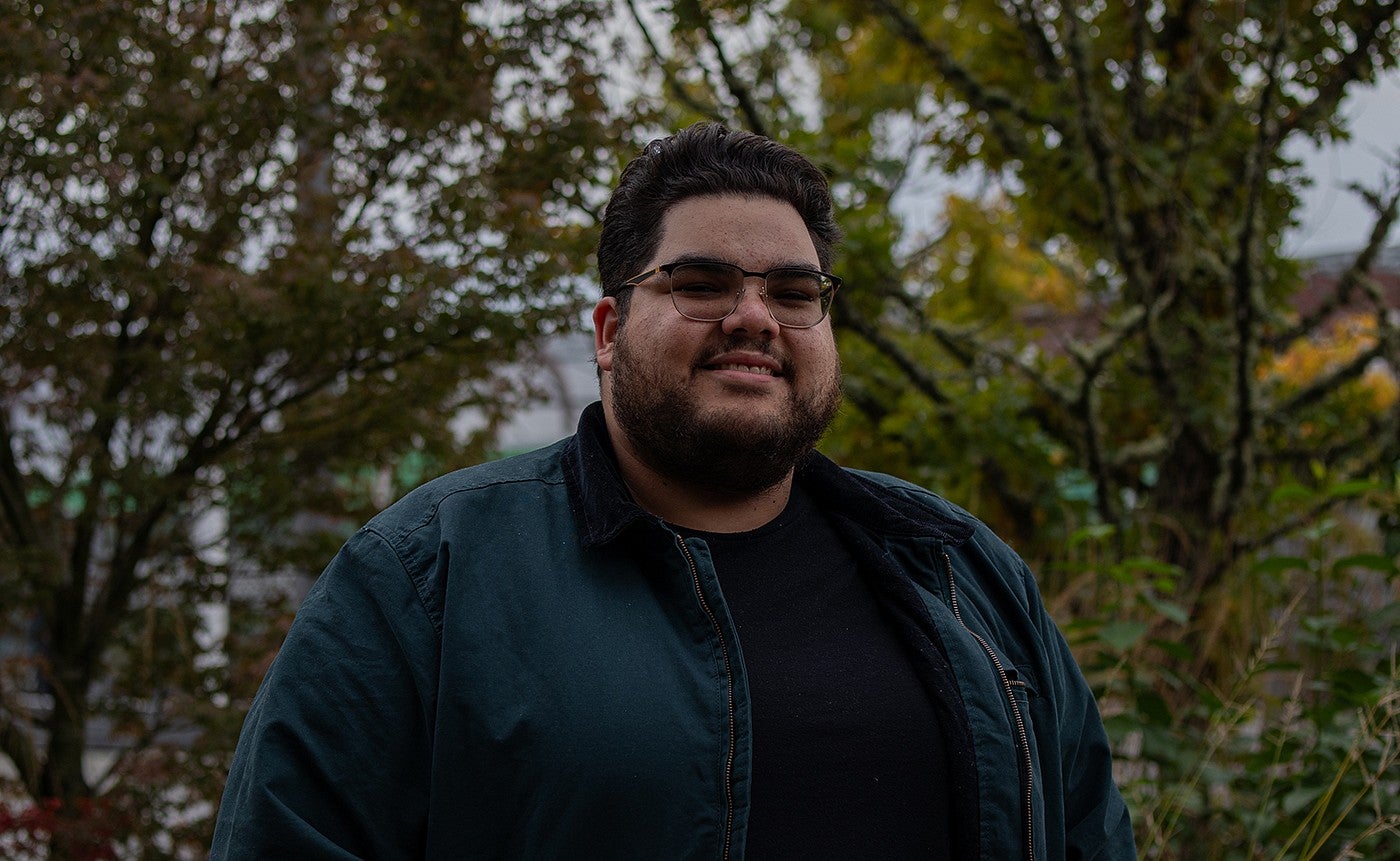
Accepting change and going farther

Salty or sweet: I’m a little bit of both. I think a lot of Caribbean cuisine tends to have a little bit of both, and that’s what I grew up with.
Show you're bingeing: I’m a big fan of Marvel and Star Wars. The Asoka series just finished, and now I’m on the Loki series.
Quote you live by: “Cogito, ergo sum (I think, therefore I am).” — René Descartes
Hometown: I was born in Los Angeles, but I spent a chunk of my childhood in Guayama, Puerto Rico. I’d say both.
Tucked away in the New Residence Hall on the University of Oregon campus is a room filled with Marvel and pop culture memorabilia, trinkets and souvenirs from Japan, and Joshua Castellanos Ramos, the new first-year advisor for the Clark Honors College. He’s ready to help students build their academic lives. The first lesson? Change is an inevitable part of life. We sat down with him to discuss the importance of family, his job working at the CHC, and the transformative power of asking for help.
This interview was edited for clarity and length.
When you were younger, what did you want to be when you grew up?
I was definitely the person that wanted to do everything. So, I went through a couple of phases. At first, I was just fascinated with marine biology. And then I wanted to be a chef. And then pretty much all through high school, I was really stuck on being an engineer. I went to engineering school and that did not work out at all… I’m obviously not an engineer right now. Plans always change, and I’ve tried to go with whatever feels best. For me, working in education was just that.
So, you gave engineering a shot in college?
I went to engineering school for three years. I completely switched gears because I just did not want to do it anymore. I took two years off school and tutored and advised high school kids for college and career planning. That really solidified me wanting to pursue a job in this kind of public space. I ended up landing here in Eugene in 2020, and I (entered the) School of Planning, Public Policy, and Management. My diploma was made official on September 16 of this year.
How did you end up at the CHC?
I was actually in Japan while I was applying for advising positions. The Honors College really clicked with me and my style of working with students, and I also think it gave me the upper hand that I, too, was a student at the University of Oregon. I really resonated with the way the Honors College makes sure students are taken care of and are seen as humans first. I was like, “This sounds just like me.” And when I had the conversation with CHC Acting Dean Carol Stabile, I just felt that we were on the exact same page.

What were you doing in Japan?
I was doing a GlobalWorks internship there, and at first I was told I’d be working at a local high school. But then on my first day, they were like: “By the way, the school board didn’t approve an intern for the summer, so you’re going to be doing something else.” A few days later, I was matched with Nippon Technology Solution and worked in the PR department. And it was a great experience.
I think one of my favorite takeaways was while the program promised an English-speaking supervisor, mine was not always around. But one of the staff studied Spanish when she was in college, and that’s my first language. What ended up happening was the supervisors would give instructions in Japanese that would then be translated to me in Spanish and then I would translate it to the rest of the interns in English. It became a game of language telephone. I couldn’t have gotten that experience anywhere else.
You help so many people as an advisor. Do you remember a time in your life when you were brave enough to ask for help?
For me, asking for help was very hard—especially coming from Hispanic Latin culture. We’re very prideful people. We don’t like asking for help. For me, I didn’t even know that getting to this point of having graduated college was even possible. I’m the first one in my entire family to do so. Asking for help became something more of like: I need to figure out how to do this. While my parents supported me getting my education, they had no idea. My father barely had a middle school education from Mexico. And my mother got through high school in Puerto Rico. We’ve never really gone further than that. While they were like: “Yeah, get educated. We believe you can do it,” they just didn’t have the resources or the capacity to understand what the system was like.
I’m very thankful for my high school mentors and I still communicate with them to this day. They were the ones who kind of started orienting me and let me know that it’s OK to ask for help; that it was OK if I didn’t know everything or my parents didn’t know everything; and there were different spaces for me to explore. I think that’s also what led me to education as a whole because I felt a need to kind of become the resource and the support that I felt I didn’t have outside of those two people that I had in high school.
I think it’s also just different, especially for me—having the high school advising experience and coming into the college space as staff and advising. You’re dealing with two completely different populations. One is forced to be there at the high school level, but they’re also generally spoon-fed with resources and support, as much as they hate it. The university space is very much an opt-in. You have to make the effort to connect with the resources here.
“I was definitely the person that wanted to do everything. So, I went through a couple of phases. Plans always change, and I’ve tried to go with whatever feels best. For me, working in education was just that. ”
Who inspires you?
Honestly, it would have to be both of my parents. They didn’t have the capacity for higher education and things of that nature. But that didn’t stop them from working as hard as they did and pushing me to go even further than them. Even when I decided to drop out of engineering school after three years, they kept pushing me. They kept telling me, “You can do more than this. You can go further.”
Advice for first-year students?
Don’t be afraid to ask for help. That’s number one. And number two, if you’re biting off more than you can chew, it’s perfectly OK to dial back. It’s perfectly OK to change course. Don’t be afraid. Don’t think that just because you’re making that grad plan in your HC 101 class that everything is set in stone. Life happens, things change, and you might find out a space is not the space for you and that’s OK.
